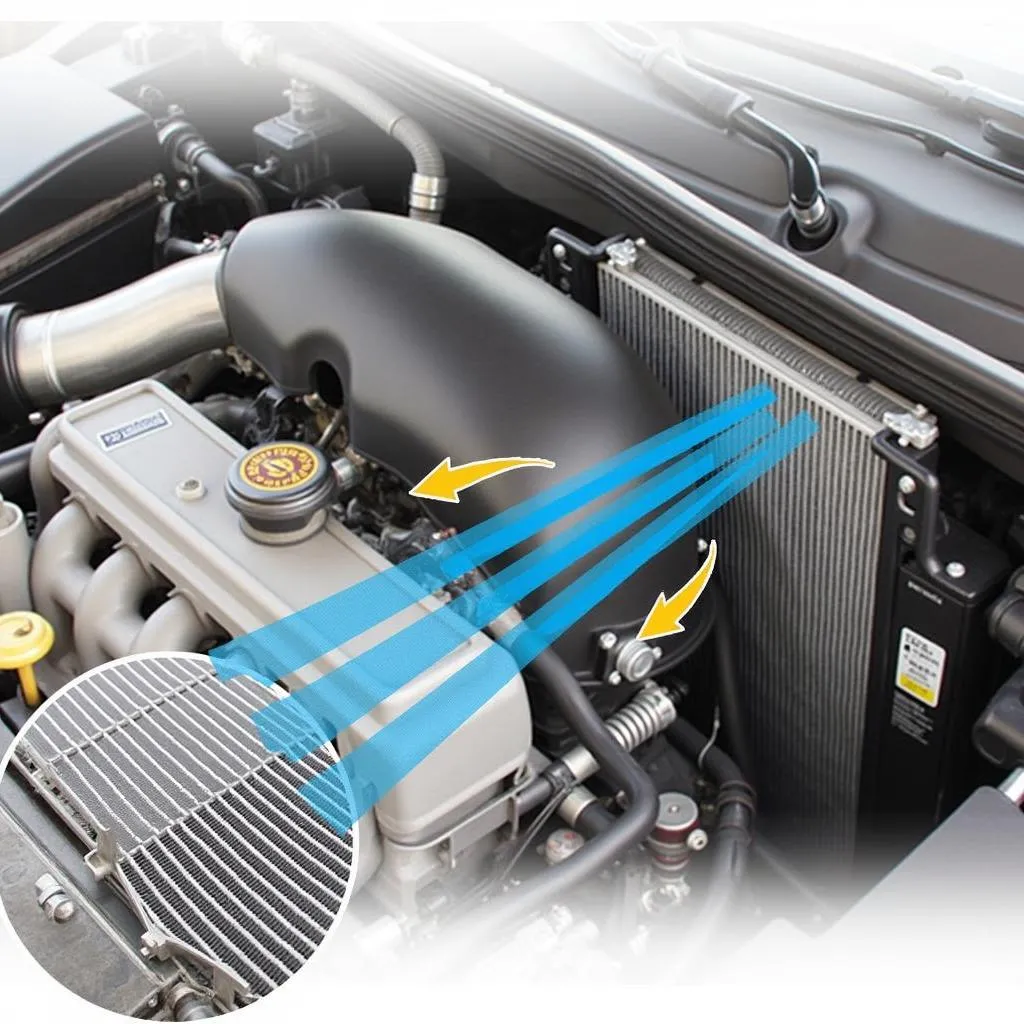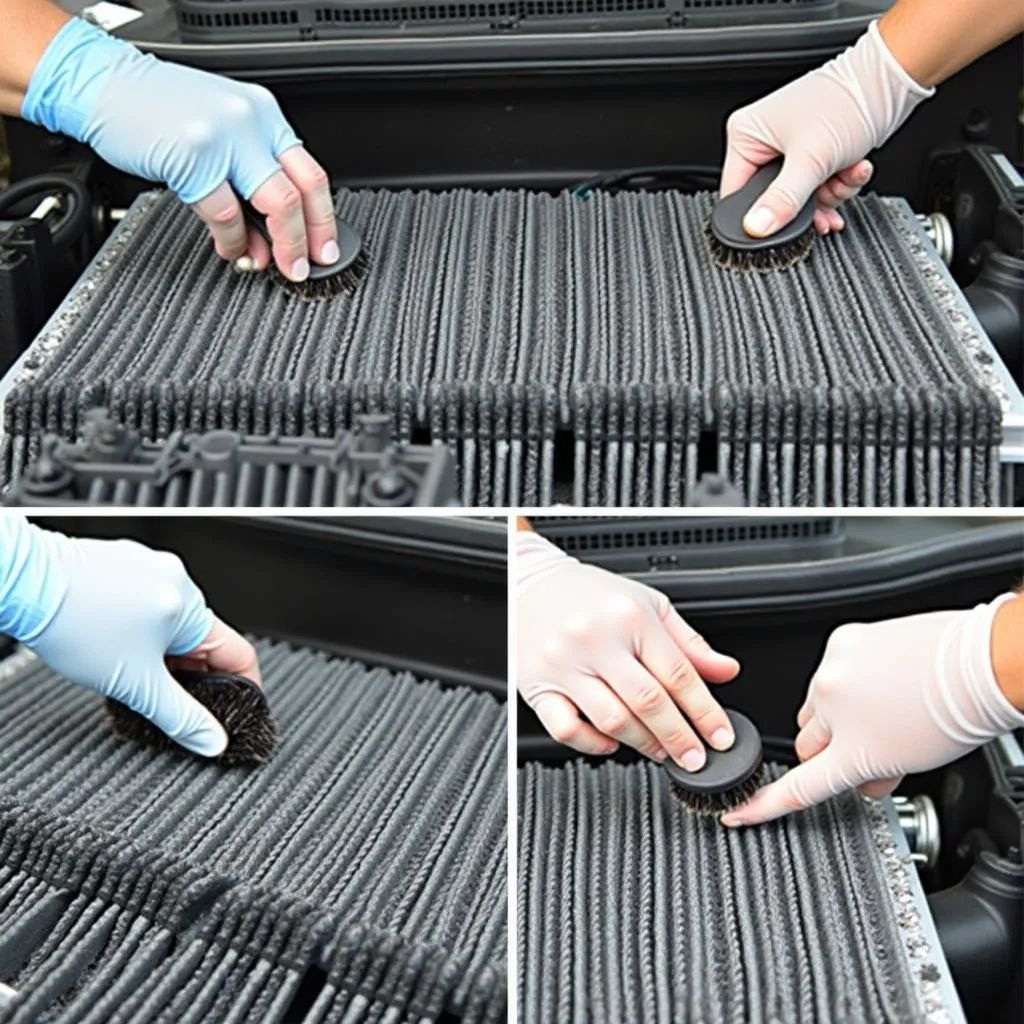Imagine this: It’s a sweltering summer day, you’re stuck in traffic on the I-95 in Florida, and your car’s AC suddenly decides to take a vacation. Sounds like a recipe for disaster, right? The culprit? It could very well be your car’s AC condenser.
Let’s dive into the world of AC condensers and learn how to keep our cool, even on the hottest days.
What is an AC Condenser and Why Should I Care?
From a mechanic’s perspective, the AC condenser is a critical component of your car’s air conditioning system. Think of it as the “radiator” for your AC. It’s responsible for converting hot, high-pressure refrigerant gas into a cool, high-pressure liquid, ready to chill your car.
From an engineering standpoint, the AC condenser is a marvel of heat exchange. It uses a series of fins and tubes to maximize surface area, allowing for efficient heat transfer to the surrounding air.
Economically speaking, a failing AC condenser can put a real dent in your wallet. Not only will you be uncomfortable without AC, but repairs can be costly. That’s why understanding this crucial component is vital for any car owner.
Demystifying the AC Condenser: How it Works and Common Issues
The AC condenser sits at the front of your vehicle, often right in front of the radiator. As your car moves, air flows through the condenser fins, cooling the refrigerant inside. This cooled refrigerant is then sent to the evaporator, which blows cool air into your car.
Common issues with AC condensers include:
- Leaks: A leak in the condenser can cause refrigerant to escape, leading to reduced cooling performance or complete AC failure.
- Blockages: Dirt, debris, and even bugs can clog the condenser fins, restricting airflow and reducing cooling efficiency.
- Damage: Physical damage from road debris or accidents can compromise the condenser’s integrity, leading to leaks or complete failure.
 AC Condenser Location in a Car
AC Condenser Location in a Car
Keeping Your Cool: Signs of a Failing AC Condenser
Knowing the warning signs of a failing AC condenser can save you from a sweaty, uncomfortable breakdown. Look out for:
- Warm air blowing from the vents: This is often the first and most obvious sign of a problem.
- Unusual noises: Hissing or bubbling sounds from the AC system can indicate a refrigerant leak.
- Decreased cooling performance: If your AC isn’t cooling as effectively as it used to, it could be a sign of a failing condenser.
- Visible damage: Inspect the condenser for any signs of physical damage, such as dents, leaks, or bent fins.
Don’t Sweat It: Tips for Maintaining Your AC Condenser
Regular maintenance can significantly extend the life of your AC condenser and prevent costly repairs. Here are a few tips:
- Regular Inspections: Have your AC system inspected annually by a qualified mechanic, especially before the start of summer.
- Keep it Clean: Regularly clean the condenser fins using a soft brush or compressed air to remove dirt and debris.
- Fix Leaks Promptly: If you suspect a refrigerant leak, address it immediately to prevent further damage and ensure optimal AC performance.
 Cleaning a Car AC Condenser
Cleaning a Car AC Condenser
What About My Car?
You might be wondering, “How does all this apply to my [Insert Car Make and Model]?” While the basic principles are the same, each car model can have its unique quirks and potential issues. For instance, certain models might be more prone to condenser leaks due to their design or the materials used.
If you are experiencing AC issues, it’s always best to consult with a qualified mechanic specializing in your car’s make and model. They can diagnose the problem accurately and recommend the most effective solution, whether it’s a simple cleaning, a refrigerant recharge, or a condenser replacement.
Frequently Asked Questions about AC Condensers
Here are some answers to common questions car owners have about AC condensers:
Q: How much does it cost to replace an AC condenser?
A: The cost of replacing an AC condenser can vary depending on the make and model of your car, as well as labor costs in your area. On average, you can expect to pay between $400 and $900 for parts and labor.
Q: Can I drive my car with a leaking AC condenser?
A: While it is possible to drive your car with a leaking AC condenser, it’s not recommended. Driving without refrigerant can damage the compressor, leading to more expensive repairs down the line.
Q: How long does an AC condenser last?
A: With proper maintenance, an AC condenser can last for several years. However, factors like driving conditions, climate, and the quality of the condenser itself can impact its lifespan.
Still Have Questions? We’re Here to Help!
Need more information about AC condensers or experiencing car AC troubles? Don’t sweat it! Contact us via Whatsapp at +84767531508. Our team of expert mechanics is available 24/7 to provide assistance and answer all your car repair and diagnostic tool needs.
Stay Cool Out There
Understanding the role of your car’s AC condenser and recognizing the signs of potential issues can save you from uncomfortable and potentially costly breakdowns. By following the maintenance tips outlined above, you can keep your car’s AC system running smoothly for miles to come.
Check out these related articles for more car maintenance tips and insights:
- How to Put Freon in Car AC
- Car Air Conditioner Repair Cost
- Car AC Not Blowing Cold Air
- How to Recharge a Car Air Conditioning System
Remember, a well-maintained car is a happy car (and a happy driver!).


